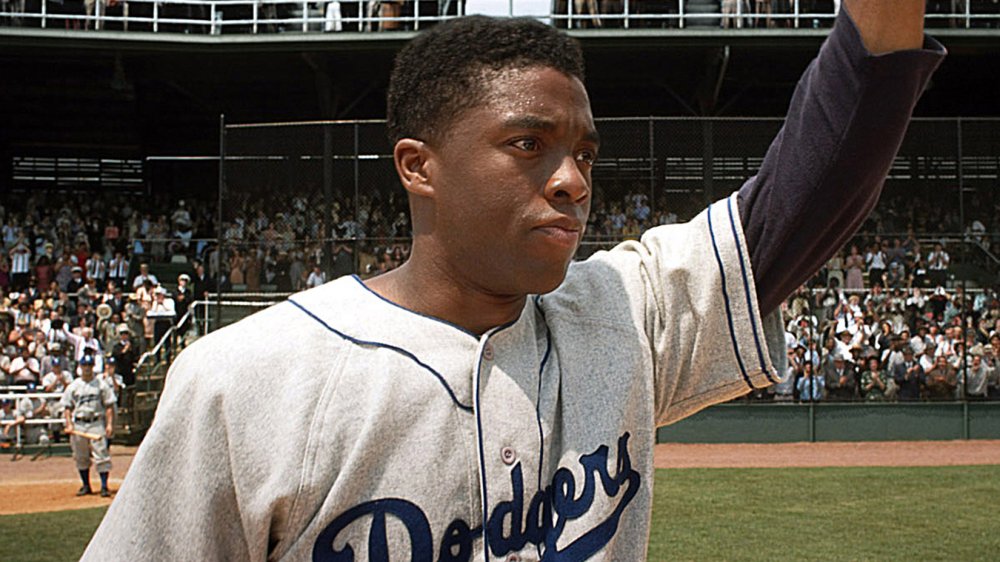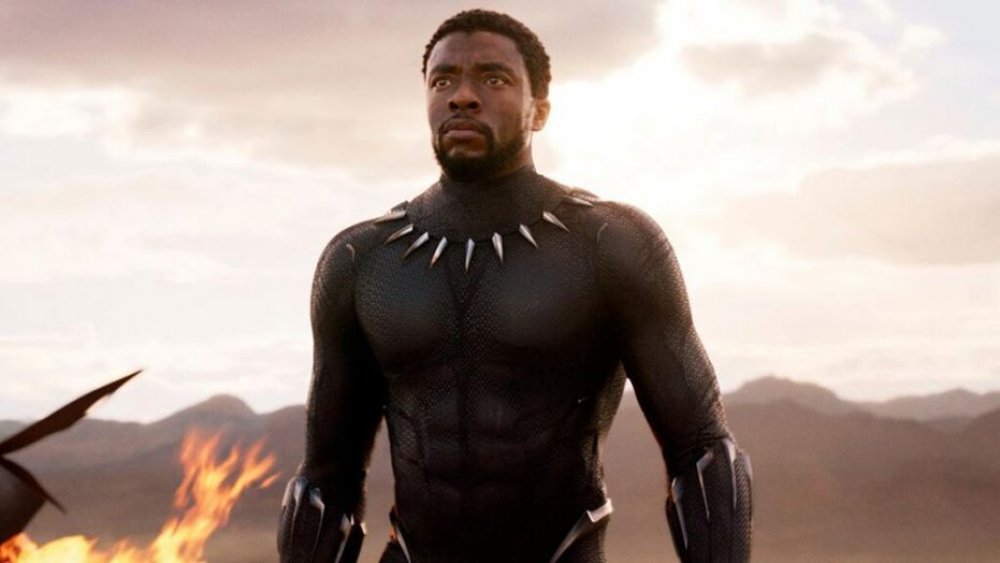How Chadwick Boseman's Role In 42 Helped Make The MCU We Love Today
The Marvel Cinematic Universe is one of the biggest franchises — if not the biggest franchise — in cinematic history. Fans have fallen in love with the genius-billionaire-playboy-philanthropist Tony Stark (Robert Downey Jr.), who wound up being a loving father and father figure who sacrificed his life for the greater good; the star-spangled Avenger Captain America (Chris Evans); the lovable goof with the power of the gods, Thor (Chris Hemsworth); and many more.
Since February 2018, though, Marvel fans everywhere have looked to one hero in particular as representative of all things good: King T'Challa, the Black Panther, brilliantly brought to life by the late Chadwick Boseman. The actor's tragic death — and the battle against colon cancer that he had kept private from the public and even close friends like Black Panther director Ryan Coogler — is now being mourned by people all over the world.
Looking back, it's impossible to imagine that any other actor could have so perfectly embodied the King of Wakanda in all his nobility, strength, and wisdom. But before Boseman portrayed T'Challa, the role that first brought him widespread acclaim was that of real-life baseball player Jackie Robinson, whom he played in 2013's 42. And if it hadn't been for 42, Boseman once admitted, he may have quit acting altogether — changing how the MCU we know and love today would have looked and felt.
Without 42, Chadwick Boseman might have never been Black Panther
Boseman was a man of many talents. In fact, his initial forays into the entertainment industry weren't as an actor, but as a writer and director. Boseman studied at both Howard University (receiving a Bachelor's of Fine Arts in Directing) and Oxford University (for a prestigious mid-summer program for dramatic arts, namely theater), and he initially only ventured into acting to gain insight on directing actors, according to The Washington Post.
When he did pick up roles, Boseman continually bumped up against Hollywood's attempts to typecast him. At 26 years old, he was removed from the daytime soap opera All My Children because he (accurately) told producers that his role as Reggie Montgomery was being written as a racial stereotype, as reported by TheWrap. (The series' team ultimately hired Boseman's future Black Panther co-star Michael B. Jordan to replace him as Reggie.)
By the early 2010s, Boseman was ready to quit acting altogether, to instead focus on directing plays in New York. Then, he auditioned for the Jackie Robinson biopic 42, and everything changed.
As Boseman told GQ in September 2014, "This was just a few years ago [when I was thinking of quitting acting]. I was waiting to hear about 42. Nobody had called me. Nobody had told me anything. I had gone in for it 100 percent, but there was no reason for me to think I'd done well. Nobody had called me and said, 'Hey, they really liked your audition.' Nobody was like, 'Hey, they're really thinking about you.' Nothing."
He then shared that things soon looked brighter, and his career trajectory shifted: "But on that night, the play I was directing ended, and I went next door to a bar and was watching the end of the World Series, and I was like, 'Yo, I'm about to get this role,' and I knew it. And that was the night they called me. Just like —boom! — 'It's yours.'
It was the success of 42 (and then the underrated James Brown biopic Get On Up) that propelled Boseman to stardom, and led to the best Black Panther that anyone could've ever hoped for. If Boseman had given up acting before he auditioned for 42 or decided to walk away from the potential opportunity to focus on directing full-time, the MCU would still exist, for certain, but it would be missing Boseman's magnetic presence as Black Panther.
The world has truly lost a legend.

